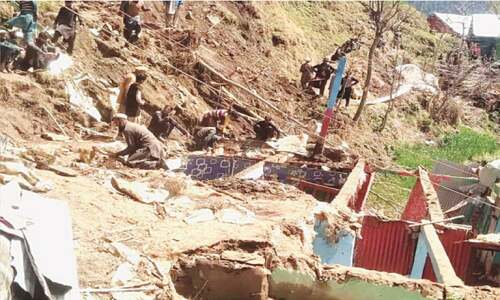PESHAWAR: National Command and Operation Centre has accelerated efforts after spike in Covid-19 cases with increase in weekly meetings with the provinces as Khyber Pakhtunkhwa is grappling to deal with high positivity rate of swabs in Mansehra, Chitral and Peshawar.
“NCOC has been holding one meeting a week with chief secretaries of all the provinces, Azad Jammu and Kashmir and Gilgit-Baltistan for the past two months but now the quantum of meetings has increased to four where the relevant officials discuss their strategies and take instructions,” officials said.
According to them, Khyber Pakhtunkhwa Chief Secretary Dr Kazim Niaz is now holding meetings with NCOC on every Thursday, Friday and Monday where he sheds light on the province’s situation with regard to Covid-19 and informs the participants of the steps being taken to deal with the situation.
The latest strategy pursued by the government is of lockdowns in hotspot areas about which chief secretary issues instructions to the home department on the recommendation of health department to put brakes on transmission of virus.
NCOC and health dept expedite efforts to deal with surge in cases
At the same time, the district administration in the high-risk districts is issued directives to implement smart lockdown with province-wide adherence to standard operating procedures.
“We have recorded high infectivity rate in Chitral with nine per cent, Mansehra seven per cent and Peshawar four per cent. These areas have been under spotlight as more attention is being given to increase level of testing and identify the positive patients, isolate them and trace their contacts,” said officials.
They said that Public Health Reference Laboratory at Khyber Medical University registered 4.5 per cent positivity of samples during the past one week which was a source of concern.
They said that the laboratory tested 8,100 suspected patients during the past one week.
They added KMU was conducting 1,150 tests per day on an average, most of the 4,000 tests conducted province-wide at 12 public health Covid-19 laboratories and efforts were underway to enhance testing, especially in the areas that were recording more patients.
Officials said that situation in Kohat, Bannu and Dera Ismail Khan was safe where the positivity rate was below two per cent but still the authorities concerned were instructed to scale up testing capacity.
They said that after receiving overall reports from the laboratories, the health department was issuing instructions to relevant districts after breakup of positive cases. Apart from the three high-risk districts, the department was also in constant touch with district health officers, in Swabi, Mardan, Abbottabad and Swat to ascertain the situation and take appropriate steps, they said.
“NCOC is extremely concerned about violation of code of conduct regarding Covid-19 and wants the district administrations to fully implement SOPs to manage the second wave of the infection which is more dangerous than the first one,” said officials. They added that alongside testing and SOPs, the chief secretary was also issuing instructions regarding strengthening surveillance and enhancement of treatment capacity.
“We have already allocated 3,100 beds to Covid-19 which include 400 for intensive care, 700 high dependency and 2,000 isolation beds but the situation is under control. Except, Hayatabad Medical Complex where bed occupancy is 30 per cent, the overall occupancy rate is 10 per cent but number of Covid-19 admission is increasing,” said officials.
They said that winter season suited respiratory virus and the same could be true for coronavirus. However, it may have small impacts and the real factor of the matter is adapting the control and preventing public health measures.
Officials said that in winter there was close contact among people as more indoor activities with poor ventilation took place. Children and youngsters in educational institutions may be carrier to elders and majority of people forget the new normal which requires strict adherence to SOPs.
“The people are considering it normal situation despite warnings by experts and government as they don’t wear masks and not avoiding handshakes and hugs. SOPs are the best safety method against Covid-19 till arrival of vaccine,” they added.
Published in Dawn, November 9th, 2020














































